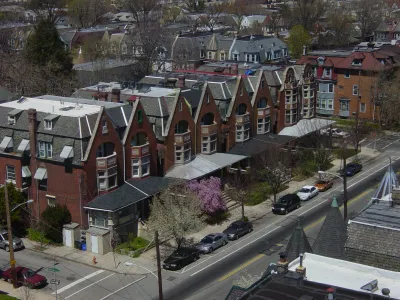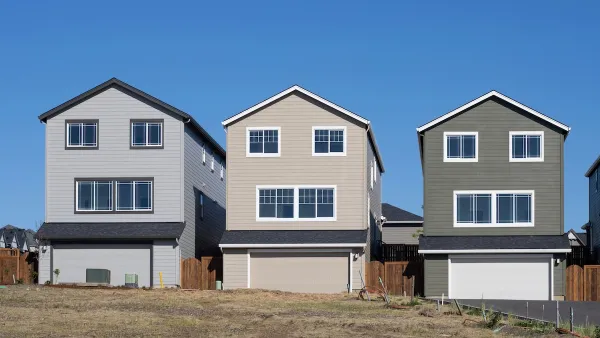From the macro scale to the micro scale, there are many ways in which the housing market playing field is tilted toward financial firms—and many proposals for how to start tilting it back.

What began in earnest during the 2008 financial crisis was exacerbated by COVID-19: large companies, often backed by powerful private equity firms, swept into the single- and multi-family housing market hoping for a big return on their investment. More than a decade later, they’re not only reaping the rewards—they’re increasing their market share.
“They just bought in bulk,” says Oscar Valdés Viera, a research manager at Americans for Financial Reform. “As people were losing their homes, they were taking advantage of that, and they’re doing that again—they’ve expanded during the pandemic.”
According to a report by Americans for Financial Reform, 1.6 million housing units in the U.S. are now owned by private equity, including over 1 million apartment units, 275,000 manufactured home lots, and over 239,000 single-family rental homes.
The report lists 22 private equity-backed companies that hold the 1 million apartment units, which they estimate is 3.6 percent of all apartment units in the country, or about 1 out of every 26 apartment listings. And 12 private equity companies are listed as owners of the manufactured home sites.
“This is just the tip of the iceberg,” says Valdés Viera, a co-author of the report. “There are only four or five private equity companies that are publicly listed that we have access to disclosures [for]. The rest of our findings are based on Facebook data, corporate websites, and some news reports.”
Because of “private equity’s deliberate opacity, these numbers most likely understate private equity ownership,” the report says. “There are a few publicly traded private equity companies—Blackstone, Carlyle, Apollo, KKR—that are subject to SEC rules and regulations including periodic disclosure requirements.”
“By and large the private equity industry thrives by exploiting exemptions and loopholes in securities law and fostered by decades of deregulation in private markets,” the report reads.
Tenants are now less likely than they were before 2008 to have “mom and pop” landlords and are more likely to be dealing with institutional investors, like Blackstone Inc., the Carlyle Group, or KKR as landlords. Along with frequent rent hikes, these tenants often see fees pile up—property administration fee, late fees, various service fees, etc.—and their buildings begin to fall apart.
First-time homebuyers cannot compete. With the supply of housing in the country severely constrained, these companies hold a considerable advantage over low- and middle-income homebuyers, who may only be able to finance through Federal Housing Administration, Department of Veterans Affairs, or U.S. Department of Agriculture mortgages, which take longer to process than a cash offer.
But efforts are underway to level out the playing field, both in terms of acquisitions and operations, from local, state, and federal governments, and even tenants and homeowners themselves.
Making it Easier to Compete
Many of the policy solution discussions on the acquisition side center around trying to reduce the advantage corporate purchasers have by giving other purchasers extra time to come up with the money or assistance in doing so. Finance mechanisms work to get loans and cash into the hands of qualified low- and middle-income buyers, while first look or first right to purchase policies give tenants, nonprofits, or community organizations a window of time when investors are not competing with them.
In California, where the housing market crunch is particularly pronounced, legislation of both types is making its way onto the books.
Two laws specifically address auction sales of distressed properties, or properties that are risk of or have gone through foreclosure. California Senate Bill 1079, which was signed into law in September 2020,
FULL STORY: Hands Off the Houses: Can We Stop Speculative Land Grabs?

Analysis: Cybertruck Fatality Rate Far Exceeds That of Ford Pinto
The Tesla Cybertruck was recalled seven times last year.

National Parks Layoffs Will Cause Communities to Lose Billions
Thousands of essential park workers were laid off this week, just before the busy spring break season.

Retro-silient?: America’s First “Eco-burb,” The Woodlands Turns 50
A master-planned community north of Houston offers lessons on green infrastructure and resilient design, but falls short of its founder’s lofty affordability and walkability goals.

Test News Post 1
This is a summary

Analysis: Cybertruck Fatality Rate Far Exceeds That of Ford Pinto
The Tesla Cybertruck was recalled seven times last year.

Test News Headline 46
Test for the image on the front page.
Urban Design for Planners 1: Software Tools
This six-course series explores essential urban design concepts using open source software and equips planners with the tools they need to participate fully in the urban design process.
Planning for Universal Design
Learn the tools for implementing Universal Design in planning regulations.
EMC Planning Group, Inc.
Planetizen
Planetizen
Mpact (formerly Rail~Volution)
Great Falls Development Authority, Inc.
HUDs Office of Policy Development and Research
NYU Wagner Graduate School of Public Service




























